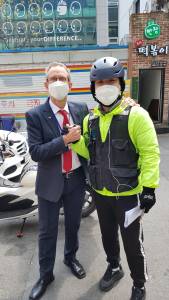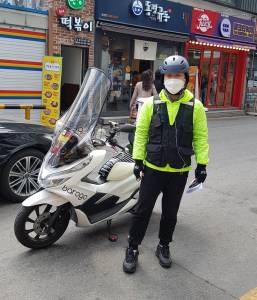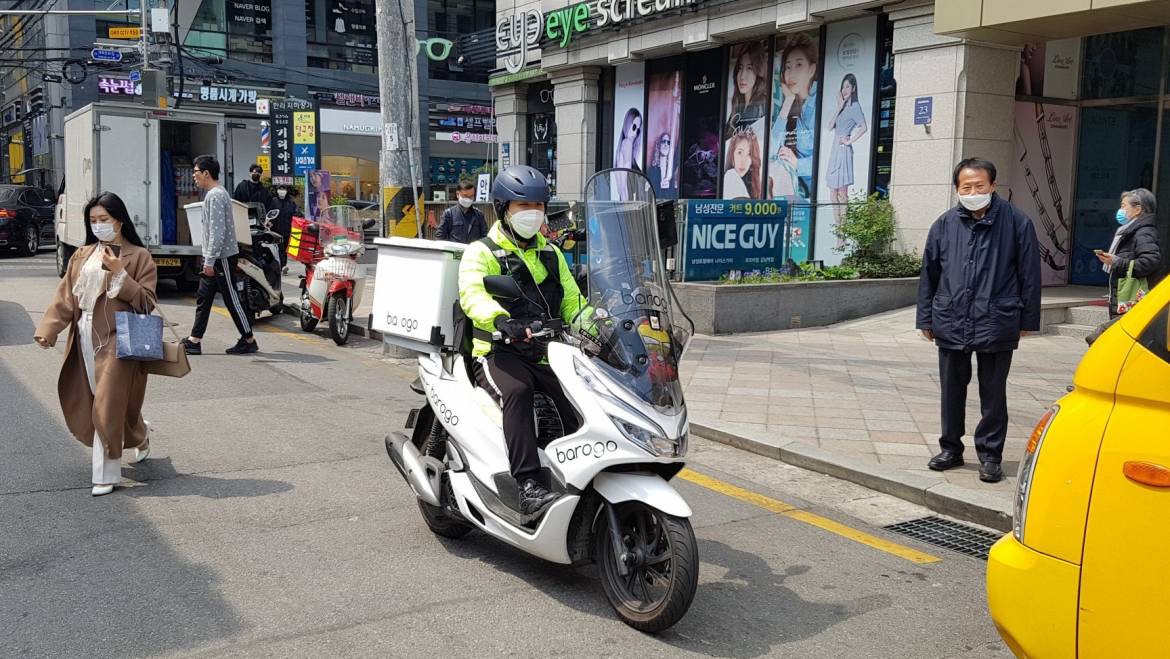After becoming an expat in November 2007, it took a while for me to get used to the sight of motor-scooter food delivery men blatantly disregarding traffic laws. They ride on sidewalks, they go the wrong way on one-way streets, they navigate between lanes of cars and buses and most of all, they ignore stop signs and red lights. Who could not be startled to observe them at major intersections—pausing and then zooming straight through or making left turns? Drivers of cars and buses patiently wait, but not time-pressed delivery men. (I use the male pronoun intentionally because if any women do this kind of work, I have not seen them.) They appear to be unconstrained by mundane matters like traffic laws, not to mention traffic etiquette. The behavior of these hellions on two wheels has only gotten worse in the last 12 ½ years. Most perplexing of all is that the police witness such constant traffic violations and blithely let them go.
I just had to learn more. Although I am not a great fan of McDonald’s, a friend and I recently called up and ordered two Big Macs, two orders of French fries and two Cokes. Assured that this tasty and nutritious meal would arrive in no more than 30 minutes, we sat in his office in Gangnam and waited. In fact, the buzzer rang a bit early. In came a young man named Noh Kyung-nam. He was wearing a  padded uniform, boots, gloves and a helmet. Simultaneously with us paying him 13,000 won, we told him of our real purpose and sweetened the deal by offering an extra 20K. He agreed to give us a 15-minute interview about the life of a food delivery man in Seoul.
padded uniform, boots, gloves and a helmet. Simultaneously with us paying him 13,000 won, we told him of our real purpose and sweetened the deal by offering an extra 20K. He agreed to give us a 15-minute interview about the life of a food delivery man in Seoul.
“I am 32 years old and unmarried,” Noh said. “I was a delivery man for various Chinese restaurants when I was in high school. I like my job, although I am not sure how much longer I will stay with it. My long-term plan is to save up enough money to open my own restaurant. Then, somebody else can make the deliveries.”
Noh does not actually work for McDonald’s. His employer is Barogo, a relative newcomer in the food delivery industry in Korea, one in which revenues exceed $16 billion per year. Koreans have become accustomed to ordering meals by phone, the Internet or smart-phone app. It’s convenient, and it’s fast—a very good thing in this country where “palli-palli” (hurry-hurry) is a way of life.
He informed us that his payment from Barogo and thus McDonald’s, KFC, Lotteria, Baskin-Robbins, Burger King and other fast-food eateries and restaurants depends on time. He receives a financial bonus for delivering quickly. In other words, there is a  disincentive for him and his colleagues to go slow. This, naturally, helps explain why they brazenly ignore the traffic laws. Inching along during one of Seoul’s many traffic jams only costs them money.
disincentive for him and his colleagues to go slow. This, naturally, helps explain why they brazenly ignore the traffic laws. Inching along during one of Seoul’s many traffic jams only costs them money.
During our brief interview, we told Noh that almost 100 food delivery drivers have been killed in the last decade, not to mention the hundreds who have been injured. I shudder to think of all the broken arms, legs and heads that have resulted from this rush to bring food to hungry Seoulites. He did not deny the dangers inherent in his job, merely stating that he drove as carefully as possible.
“What about when you zip through a red light at a busy intersection?” I asked him. “Aren’t you pushing the envelope when you do that?” Noh smiled and said it was part of the job.
I inquired about the police and their laissez-faire attitude. “Since a license plate is affixed to the back of your motor scooter and you have a driver’s license, it would seem that you are officially part of the city’s traffic system,” I said. “Do you concur?” He did, but noted that the police realize that he and the others have no choice but to hurry.
Noh then made a key point: “It’s not easy for them to catch us. They are in cars, and we are on scooters. We can weave through traffic easily and quickly. Even if they tried, they could not catch us. So they just let us go and hope we do not cause an accident.”
We bid the young man farewell, got into a taxi and drove to a nearby police station. After making clear that we were not criticizing them but merely in search of better understanding, I asked, “Why do you let these  motor-scooter delivery guys ignore the traffic laws? Is it not dangerous to them, other drivers and pedestrians?”
motor-scooter delivery guys ignore the traffic laws? Is it not dangerous to them, other drivers and pedestrians?”
A male officer said, “We agree that they are dangerous, but it is part of the culture of Korea where everything must be delivered quickly. Chasing after them would be even more dangerous.”
A female officer added, “The Seoul Metropolitan Police Agency recently issued a directive saying that traffic regulations regarding motor-scooter delivery men should be enforced. But you have to realize that we can’t catch every single one.”


22 Comments
Richard:
Thank you. I loved it. Great article especially with the interview. It must be a crazy site. I’ve seen many a pizza delivery driver go through stop signs and red lights over the years in America!
Best wishes,
Rex
Rex, it surely happens elsewhere–including Tucson, AZ. Thanks for reading!
Even they are in a hurry, it is not an excuse to violate traffic rules. What is a little incentive in exchange for the risk of accident and worst losing of lives? Lately, food delivery through motor bikes become in demand here because of covid and i hope they will not do the same. It is a nice article, you are observant Rich.
Thanks, Dr. C!!!
Great article, Richard-such a different culture…but, maybe not. Sounds not that different from the non-enforcement of the 55 mph speed limit.
55, that was a long time ago…wasn’t it?
Considering how many of them have made so many trips in that amount of time, it doesn’t seem to be that dangerous. The most dangerous part of this is probably eating McDonalds! Gross!
Not dangerous? You have to be kidding. Come to Seoul and take a look. And the quality of the food is really not the point.
I totally agree with your feeling toward those delivery men in Seoul city.
There are so many single households in Seoul and because of Covid 19, the demand for food delivery is exploding.
That’s why multi national enterprises are drooling eager to invest in Korean delivery companies.
As you mentioned in detail, some Seoulites just don’t like the companies and delivery guys, but others find it convenient and easy way to satisfy their gastronomic pleasure.
I am always vexed very much by these delivery guys who outrightly ignore all traffic regulations, and companies which promote that kind of practice.
Police policy and practice is also problematic.
They usually concentrate on serious crimes like murder, kidnapping, sex trafficking, drug dealings for publicity and possible promotions and look the other way at this kind of petty crime.
So for the forseeable future, I have to live with the noise and the scenes of habitual traffic law violations.
“Vrooom~~~” There goes another delivery guy and I am pissed off again.
Matthew–they should have nipped this in the bud a long time ago. But it has become an accepted thing, and attempting to change it now seems hopeless. The Police Agency’s directive is unlikely to have any effect.
Very interesting article. I wonder how this “hurry, hurry” attitude in a culture contributes to heart disease and other ailments, not to mention the ingestion of fast food that isn’t healthy either. Some of the delivery drivers won’t have to worry about the long-term effects of these ailments as their livelihood may cut that problem short before it has a chance to arrive. The big question for me is, what happens when a society doesn’t “stop to smell the roses” while they are speedily wolfing down their quarter pounders? The U.S. has that problem also.
Ms. Sorensen Evans, thank you for your comment. It seems that most of these fast-rushing Koreans would not even think of stopping to smell the roses.
Korea definitely has a “hurry-hurry” culture! Although it’s funny you mention this detail about motorbikes… I was just having a conversation with someone the other day about how you see this a lot of this behavior in cities within the U.S. as well. Individuals on motorbikes know that vehicles in heavy traffic won’t be able to catch them, so they often get away with treating traffic laws more like “guidelines.”
Out of curiosity, what was the biggest culture shock for you when moving to Korea?
Oh, I am sure this stuff is not limited to Korea.
Since the coronavirus outbreak, delivery men have been using their life to deliver food to the others staying at home to prevent the spread of the virus. Respect to those essential workers. delivery man really did a great job during this pandemic. they deliver eventhough being outside is not safe.
Yes indeed, respect to these guys.
I’m a brazillian, and people definitely get offended by honking! I think it’s because people usually only honk when they’re mad. I only honk when it’s an emergency. Great article, by the way! Know something about another cultur are very interesting
There was no reference to honking in this story. Nevertheless, thanks for your comment.
I try to avoid honking in the Puerto Rico because it can easily be considered offensive. I know I’m late,but in Puerto Rico,honking is like “MOVE YOUR * AWAY” or go faster…..and also to insult… And The only times I do it is when someone is backing up towards me and I don’t think they see me. I learned to drive from my dad on rural roads with no traffic.
This has nothing to do with honking.
i live in Germany and over here honking is just kind of rude. If one honks that usually seems like one is very stressed and unfriendly. But sometimes it is necessary… I personally just have the feeling that people do it out of impatience or because they are angry.
I made no reference to honking. It was about Korean delivery drivers and how unsafe they are. Not honking.
Add Comment